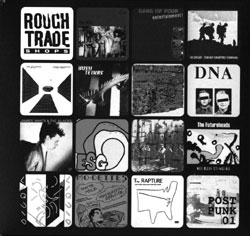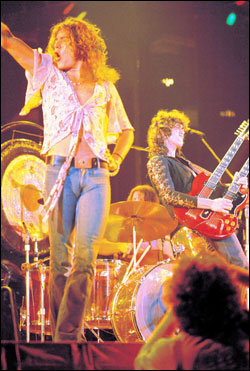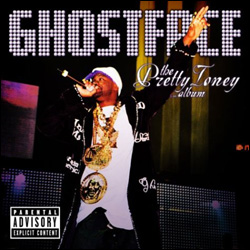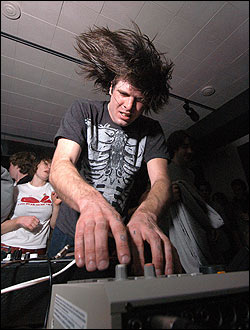IF, LIKE ME, you sometimes take your dance-floor boom-tick with a healthy shot of skronk, squeak, or snap, then the recent revival of punk-funk label Zé Records will make you skip a beat. In one of a seemingly endless flashes of brilliance from turn-of-the-’80s, New York founder Michael Zilkha read the zeitgeist perfectly in that brief, impossibly fertile period where punk, disco, and the academy got it on like bunnies. Now that Zé’s aesthetic has been exhausted by every carpetbagging indie band that five years ago would have been copying vibraphone patterns off old Arthur Lyman records, it may seem a tad tardy for Zilkha to revive his long-dormant label and begin reissuing its classic sides. But, like an N.W.A. reunion in the face of Jay-Z, I can’t hate. The presupposed obscene bounty of the (still largely unavailable) Zé back catalog should melt any cynicism, right? And if your dream supergroup would melt down Chic, the MC5, Ornette Coleman’s Prime Time, and Nico, then Zé is the greatest record label on earth.
That’s pretty much what you get opening Mutant Disco, a radical expansion (19 “new” tracks) of the six-song 1981 album that gave the Zé aesthetic its most succinct name. Was (Not Was)’s “Wheel Me Out” is a psychosexual funk collage of keening strings, electric Miles trumpet, and slashing metal chords. (Those of you who only know “Walk the Dinosaur” are to be both envied and pitied.) The pinched string parts sour disco’s cocaine fizz, melting into a malevolent fog that creeps across the dance floor. A clutch of voices recites brief snatches of impenetrable text (“Then I was discouraged by you!”), punctuated by bouts of guitar-Tourette’s, played by the MC5’s Wayne Kramer. Compared to the Alberto VO5 treatment of latter-day pretenders like Fischerspooner, this is boiling oil.
After that, the invention comes fast and vicious, a Who’s Who of the unjustly forgotten and marginalized. Cristina rolls over a Beatles standard, talks about “Disco Clones,” and then “Blame[s] It on the Disco,” which I guess lets the aforementioned clones off the hook. The sublime August Darnell, aka Kid Creole, shakes his Coconuts and somehow finds the common ground between Cab Calloway and Mick Jagger. Coati Mundi’s venom-fanged call-and-response “Que Pasa/Me No Pop I” actually went Top 40 in England. (They like weird stuff over there; see also Laurie Anderson and Bob the Builder.) The Aural Exciters were a Zé supergroupMundi, Darnell, Chance, Taana “Heartbeat” Gardnerwhose “Emile (Night Rate)” is a post- disco, post-punk, post-hippie update on those electric jazz sessions of the mid-’70s, when rolling the tape seemed to be an afterthought.
NY No Wave, Zé’s other new compilation, is altogether pricklier. The itchy-scratchy downtown art-phag response to punk, no wave is still best represented by the ridiculously overhyped (and, due to its Japanese-import-only status, overpriced) No New York. But epoch- defining compilations don’t come along every epoch, let alone during retro- leaning dry spells. NY No Wave boasts more intimate pleasures: Lydia Lunch’s “Lady Scarface” imagines a tryst between the Shangri-La’s and Jimmy Durante, with horn charts by the guy who scored The Flintstones (for real, no shit). Lunch’s band Teenage Jesus and the Jerks cough up “The Closet”; as tunnel-vision versions of rock and roll go, this can make you understand why she called her publishing company Infantunes. James Chance (né James White) and the Contortions (né the Blacks) approximate crank bugs under the skin on their two cuts, “Contort Yourself” and “Design to Kill,” while the supremely noisome Mars kill rock dead. There’s plenty of padding, with a lot of lesser lights playing spindly novelty tunes, most notably the duo Arto/Neto, whose relative negligibility makes one pine for the inclusion of Arto Lindsay’s other band from the period, the multiculti collapse rockers DNA.
New York Noise (Soul Jazz) is subtitled “Dance Music From the New York Underground 1978-1982,” and if you remain unconvinced about dropping cash for both Mutant Disco and NY No Wave, consider this the happy medium, which includes some of the same artists. The highlight, Rammelzee vs. K-Rob’s 1983 hip-hop classic “Beat Bop,” will never cold-rock a party, but the dublike dropouts, echo-warped old-old-school groove, and Ramm’s fucked flow (imagine Pigmeat Markham crossed with Kurt Schwitters) are still about as far out as rap has gone while remaining legible as itself. The rest is a totally serviceable collection of classics. ESG bridge the gaps between the J.B.’s, new wave, and the Archies. Liquid Liquid are still as single-mindedly rhythmic as post-punk ever got. And Soul Jazz are rapidly becoming the K-Tel of the black urban diaspora.
ROUGH TRADE SHOPS: Post-Punk 01 is a U.K.-centric cousin to the Zé aesthetic. The fifth of British Mute’s recent compilations celebrating the legendary London record shop and label following a four-disc 25th-anniversary box and double discs dedicated to electronica, garage rock, and the year 2002, Post-Punk 01‘s 44 track selection is a little exhausting, actually, like a jukebox put together by the nicest hipster record store clerk ever, one who’s even kind enough to draw you a map between the original p-punkers (Gang of Four, ESG, Swell Maps, 23 Skidoo) and modern descendants like the Rapture, Erase Errata, and Les Georges Leningrad. Hipsters will abhor it: “Twenty bucks for dozens of records I spent years tracking down?!” But for those of us without an eBay addiction and a mesh-backed hat, it’s a godsend: an endlessly listenable encapsulation of all those single artist reissues and incomplete comps from the last few years and stuff still unavailablewhich is to say, most of it.
Fame follows form. What was originally a tangle of margin scribbling representing a scene in a healthy first bloom gets whittled to the three or four or 10 most “appropriate” artists. As always with aesthetic gentrification, this is both a blessing and a curse. At its best, it cracks a subculture’s hermetic code for the punter, makes available (even in part) its hidden bounty, separates the wheat from the chaff, etc. This is no bad thing when so much of it is messy, unfinished experiments representing a heightened engagement not just with pop culture, but with any and all music of the moment. Which reminds us that, fun as they are, these collections are now a closed chapter. Any real future is going to come from an engagement with the presentwhich is what gave these records their power then, and what makes them models for forward-thinking musicians now.








